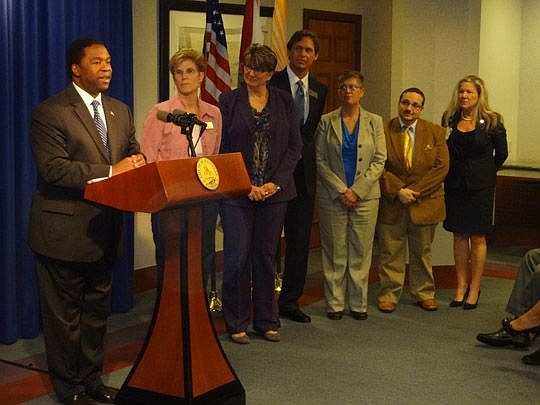
Many of the first-time offenders brought to the Juvenile Assessment Center are at a critical point.
Some have mental health issues and substance abuse problems that have impacted their lives and likely contributed to the reason they ended up in trouble with the law. Without help, the juveniles often become regulars in the criminal justice system.
Now, a $1.2 million grant announced Wednesday will provide additional staff and services to assess more first-time offenders, a step that has been lacking because of budget shortfalls.
Advocates say that early help could help keep the youths “out of the deep end” of the criminal justice system.
Mayor Alvin Brown and officials with several state and area organizations announced the three-year grant, part of $8.4 million that was awarded throughout the state for the cause.
Youths arrested are taken to the center, where they are screened. Those screenings can show indicators of mental health and substance abuse issues, but a full assessment isn’t performed on 60 percent of the offenders.
The goal is to have the youths diagnosed, treated and kept out of jail.
An official in the State Attorney’s Office called mental health issues a “major concern.”
“A lot of kids are going to prison based on never being assessed for mental health,” said Alan Louder, office director of juvenile diversion.
With the grant, Gateway Community Services will hire several more counselors who could do assessments in the facility and at the homes of the youths who are released. Once diagnosed, they would then be referred to the proper programs within the System of Care Initiative, which was awarded a $9 million grant in 2010 to better meet the needs of youths with serious emotional disturbances.
The $1.2 million grant is projected to help 900 juveniles over the three years and will be monitored by the Jacksonville Journey Oversight Committee.
Dr. Jeffrey Goldhagen, a pediatrician with UF Health and a children’s mental health advocate, called funding for the services “critically important” to children and teens who are at greatest risk.
State spending for mental health agencies ranks low on the national average, but Goldhagen said the community has rallied around the need for mental health services and is recognized as a leader in its response.
“Jacksonville has rapidly emerged as a community on the cutting edge of developing systems of care and approaches to dealing with mental health,” he said.
Brown added the mental health component and funding as the fourth part of his Youth Initiative.
“The goal is to keep kids out of trouble, prevent crime and ensure a safer community for everyone in Jacksonville,” Brown said. “Too often, kids with mental health and substance abuse problems fall into the shadows. … Early intervention is crucial.”
The first three areas of Brown’s Youth Initiative deal with expanding his summer jobs programs for teens; allocating additional funds for Teen Court and Neighborhood Accountability Boards
that provide alternatives to arrest and detention; and setting up a Young Leaders Advisory Council comprising high school juniors and seniors with leadership potential.
@writerchapman
(904) 356-2466